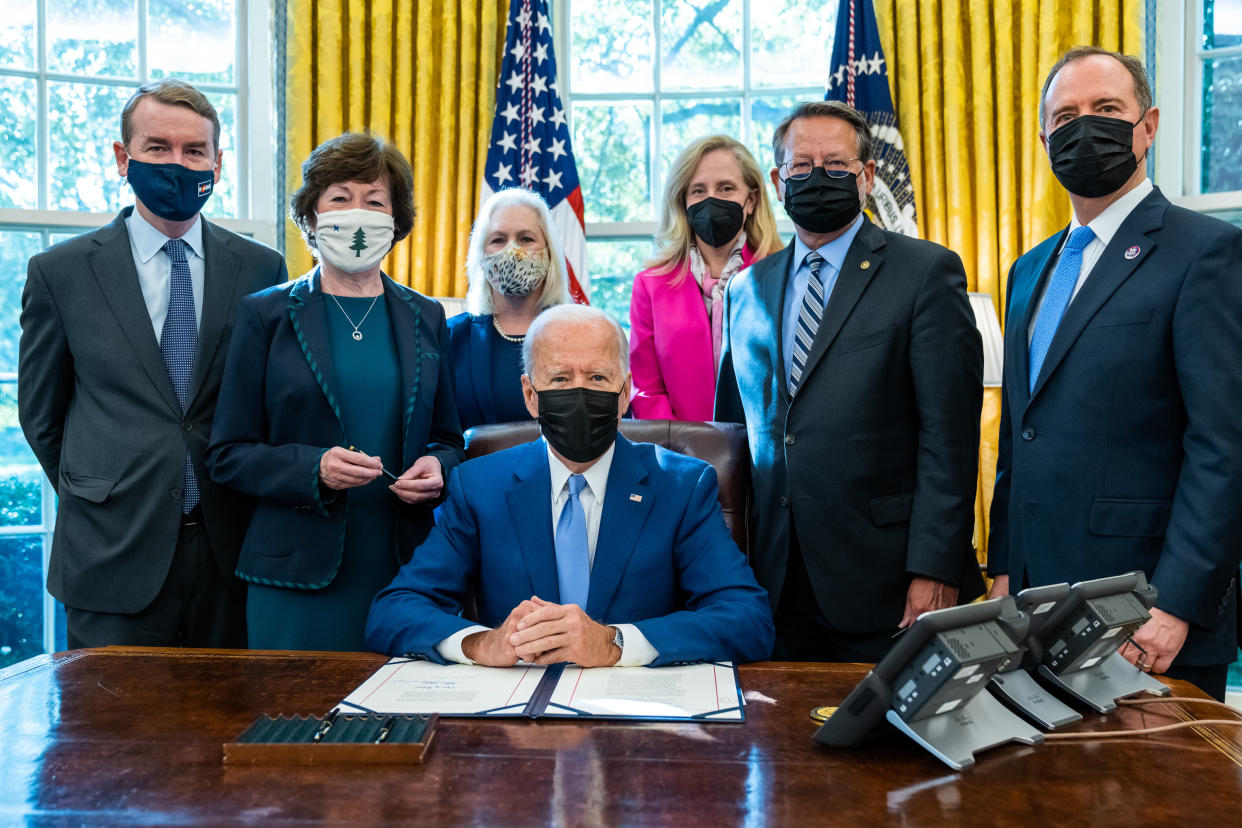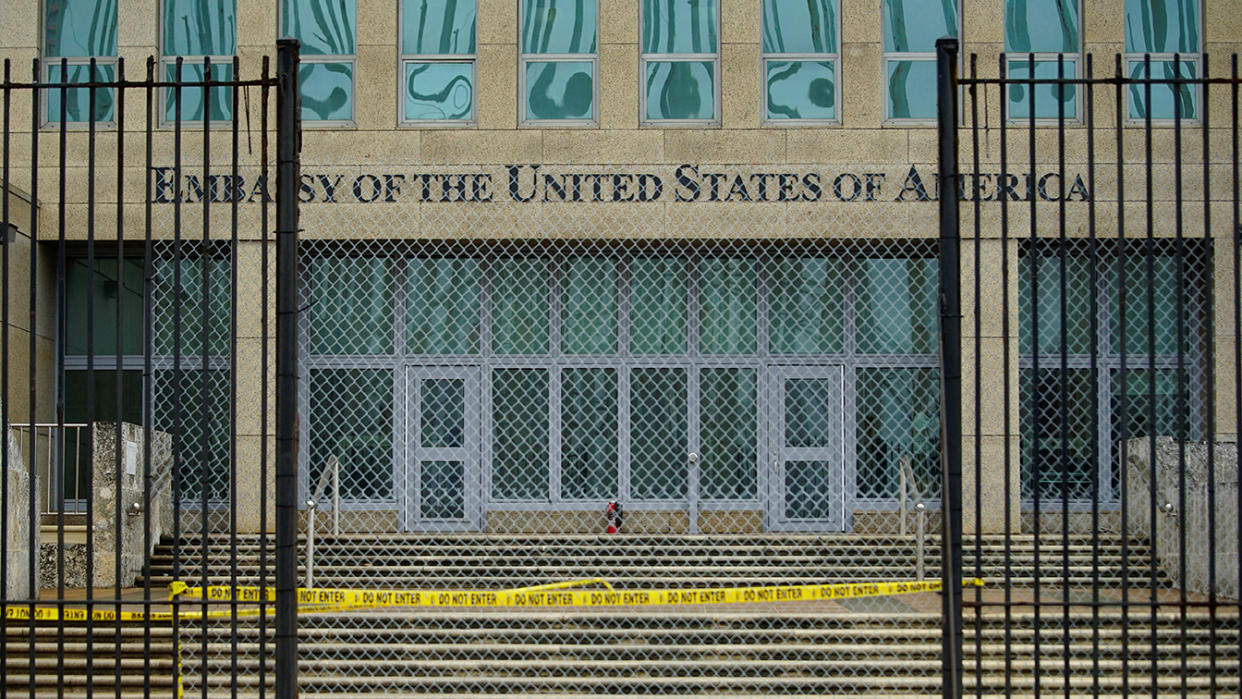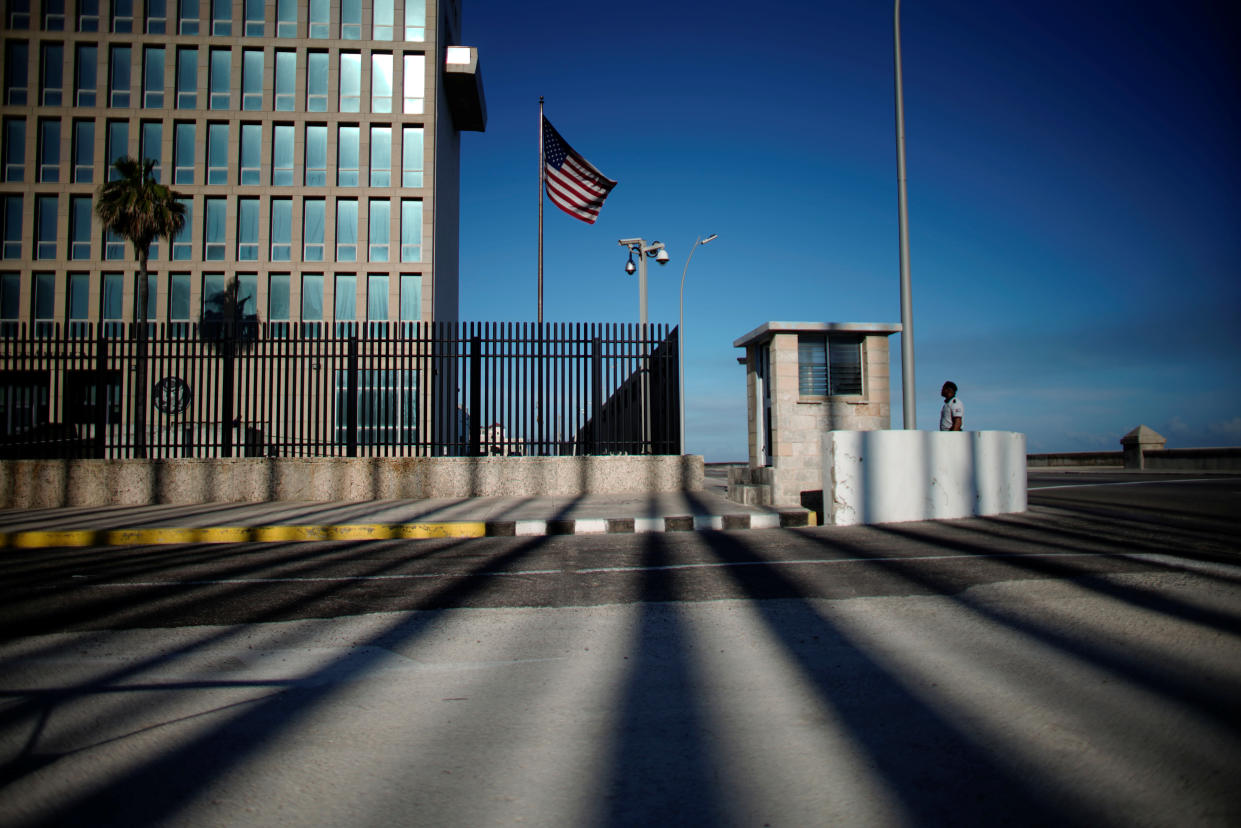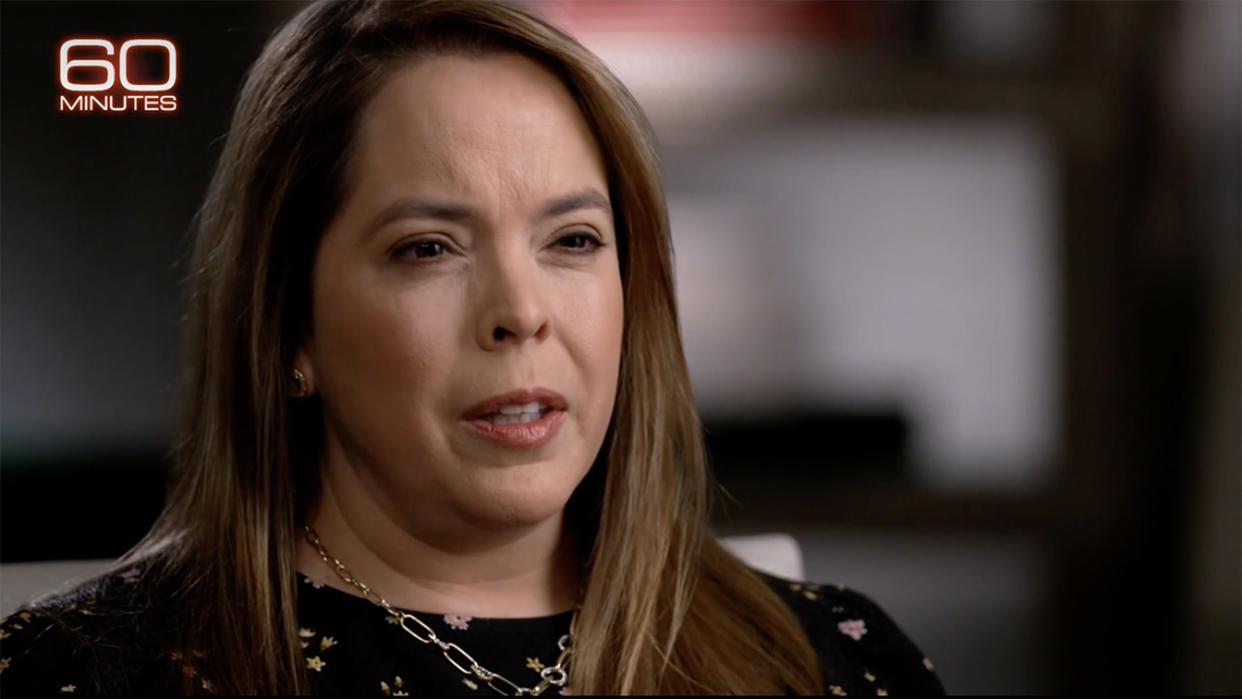Top U.S. officials cast fresh doubt on sensational 'Havana syndrome' claims
A top State Department official, countering claims that have circulated widely among members of Congress and the news media, says in a new interview there is no evidence that any external actors caused the "Havana syndrome" health incidents reported in recent years by over 1,100 U.S. diplomats and spies.
The comments by Brian Nichols, assistant secretary of state for Western Hemisphere affairs, are especially striking given they come at a time the CIA and the State Department have begun making arrangements to compensate — with payments of up to $189,000 — current and former U.S. officials suffering from unexplained brain injuries under a law, the HAVANA Act, passed by Congress last year and signed by President Biden.

But even as those payments go out, a Yahoo News investigation has found there is mounting skepticism among senior officials about a key underlying premise of the new law: that the symptoms associated with Havana syndrome — which the government formally refers to as Anomalous Health Incidents (AHI) — can be linked in any way to hostile attacks by a foreign power.
"We have not identified any outside causality in any Anomalous Health Incidents," said Nichols in an exclusive interview for a new three-part series for Yahoo News' "Conspiracyland" podcast, "The Strange Story of Havana Syndrome." The series debuts today with an episode recounting how claims about Havana syndrome led to a breakdown in U.S. relations with Cuba.
The remarks by Nichols — who oversees Cuba policy at the State Department — echo, but in some respects go beyond, recent comments by CIA Director William Burns that the agency has not found any foreign actors, including Russia, to be responsible for a "sustained global campaign on the scale of what has been reported" to harm U.S. officials and that "a majority" of Havana syndrome cases could be attributed to alternative environmental and medical factors.

Havana syndrome generally refers to a range of symptoms — hearing loud, piercing noises followed by dizziness, headaches, extreme fatigue, vertigo and, in some cases, brain injuries. In fact, a CIA task force found that many of the reported cases could be ascribed to random and completely pedestrian factors, such as proximity to faulty electrical wiring or, in one instance, exposure to an ultrasonic pest repellent designed to deter possums and rodents, sources familiar with the CIA task force's investigation told "Conspiracyland."
The agency acknowledges there are still about two dozen core cases with perplexing symptoms that are still under investigation. But a source familiar with the task force's work told Yahoo News the agency hasn't "found a foreign connection to anything yet."
Such findings, still preliminary, are viewed as highly sensitive within the Biden administration given the enormous publicity Havana syndrome reports have gotten in recent years and the natural sympathy those suffering from real and often serious health ailments have received.
But privately, senior officials say the lack of hard evidence has made them increasingly dubious about the existence of a supposed microwave superweapon or other exotic devices that might have caused the symptoms — an emerging view that suggests the entire Havana syndrome narrative, as has been reported by much of the media for the past five years, may end up being a conspiracy theory that simply never panned out.
"I was initially very convinced that this was some type of offensive operation by a foreign military or intelligence organization," said John Cohen, who served as acting undersecretary for intelligence and an analyst at the Department of Homeland Security between July 2021 and April 2022, told "Conspiracyland." "In my mind, there were just too many people who were experiencing these symptoms."

But Cohen, speaking publicly about this for the first time, added: "As I began to read the data, read the intelligence, read the results of the investigations and the assessment work that was being done around the world, it just became harder and harder to explain these instances as an attack. I never saw anything that was clear-cut that provided even an identification of who was doing it … or a definitive source for what was causing these symptoms."
Instead of any hard evidence that Havana syndrome was the result of foreign attacks, Cohen added, he found little more than "a lot of conjecture, a lot of speculation — a lot of knowledgeable speculation.
"I'm a law enforcement person. ... I grew up in the 'Dragnet' era. You know, it's like Joe Friday said, 'Just the facts. Show me the facts.' And in this case, they never were able to."
Disputes over the issue grew intense and led to sharp debates within the Biden administration. The reported health symptoms were genuine and often serious if unexplained — and senior officials, including CIA chief Burns and Secretary of State Antony Blinken repeatedly emphasized the need for thorough investigations and medical help for those affected.
But behind the scenes, there were repeated clashes between intelligence officers convinced they were victims of hostile actions from a foreign adversary and senior officials who were skeptical, according to Cohen. "It almost became, on one side of the issue, 'Hey, you don't believe me. I'm telling you I was attacked.'"

The issue became so disruptive, Cohen says, that U.S. intelligence officials even began pursuing a theory that the entire Havana syndrome controversy was being stoked by a foreign intelligence "disinformation" campaign designed to play up health incidents in order to create chaos within the U.S. intelligence community and to undermine internal "cohesion." But no evidence of that alternative theory about Havana syndrome was found either, Cohen added.
The "Conspiracyland" podcast traces the origins of the Havana syndrome story to initial reports out of Cuba in 2017 that CIA officers and U.S. diplomats were suffering unexplained health problems, including dizziness, vertigo and extreme fatigue, often after hearing strange sounds that resembled the chirpings of cicadas or crickets — some of which were purportedly recorded by those who thought they had been attacked.
Subscribe to 'Conspiracyland' on Apple Podcasts
President Trump immediately blamed the Cuban government. "They did some bad things in Cuba," Trump told reporters in 2017 after the State Department announced it would be pulling many of its staffers out of Havana. Then-Secretary of State Rex Tillerson called the health incidents "targeted attacks," citing them as grounds to pull most of the newly reopened U.S. Embassy staff out of the country.
The issue was seized on as new evidence of Cuban untrustworthiness by two Cuban American U.S. senators who have been highly critical of that country's Communist government: Republican Marco Rubio of Florida and Democrat Bob Menendez of New Jersey.
"Would it not be fair to say that in Cuba, either it is the regime who conducted these attacks, or they have full knowledge of who conducted these attacks?" Menendez asked a State Department witness at a 2018 Senate Foreign Relations Committee hearing.

But from the outset, some Havana embassy officials privately expressed concerns to members of Congress that the matter was being exaggerated by a small group of CIA officers who were experiencing symptoms and opposed better relations with Cuba.
The Embassy officials "didn't believe that this was a deliberate attack by the Cuban government against diplomats," said Rep. Jim McGovern, a Democrat from Massachusetts and now chair of the House Rules Committee, describing private briefings he received in 2017. "In fact, they were raising the issue that it might be something other than an attack. It could be a virus, or some sort of other factor that may have impacted some of the embassy personnel."
"And then ... as the word got out about that, the mere suggestion that you may have been exposed to something had some people at the embassy saying, 'Well, you know, maybe I have it. You know, I haven't been as sharp. I haven't, you know ... I felt dizzy, you know. I wasn't feeling well at some point. Maybe I too was a victim.'"
Still, some of those cases appeared compelling, even if ultimately inexplicable. Speaking on the issue for the first time publicly, Karen Coates — who served as a human resources officer at the Havana embassy — told "Conspiracyland" that she was walking down a hallway in Havana when she was bowled over by loud, piercing sounds that resembled cicada chirping.
"It was like a teapot on steroids," Coates said. "It, literally, it was so incapacitating that I ducked down with my head, my hands over my ears. … All of a sudden I had this massive pressure in my face, where it felt like my face was literally gonna blow out." That night, Coates said, she became "very discombobulated" and "started having headaches. I couldn't walk."

She was ultimately medevaced off the island and has spent years being evaluated and treated by government doctors — with no clear diagnosis — while suffering a significant cognitive decline. "I was a highly functioning individual," she said. "Now, like, I really have a hard time trying to talk and think."
The prevailing view, at least at first, among some U.S. intelligence officials, was that the incidents were caused by attacks from a microwave weapon deployed by Russian intelligence services. It was a theory that was influenced by years of controversy during the Cold War over claims that the Soviets were targeting U.S. diplomatic sites with microwave attacks. (The Cold War clashes over suspected Russian microwave attacks is detailed in the second episode in the "Conspiracyland" series, entitled "The Moscow Signal," which will be released Sept. 20.)
The idea of a global Russian campaign appeared to get traction as reports of attacks multiplied among U.S. diplomats and spies all over the world, including reported incidents in Austria, China, Uzbekistan, Germany and Colombia. Last August, Vice President Kamala Harris's trip to Vietnam was reportedly disrupted by an attack against an unidentified U.S. official in that country. (Curiously, U.S. officials say they are unaware of any reports of such attacks in the one country Moscow cares about the most: Ukraine.)
The continuous steam of such reports prompted Congress last year to pass a law to compensate U.S. government officials who experienced brain or neurological injuries from their overseas service, calling it the "Helping American Victims Afflicted by Neurological Attacks Act," dubbed the HAVANA Act, even though by then only a small fraction of the incidents had taken place in Cuba. Republican Sen. Susan Collins of Maine, the lead sponsor of the law in the Senate, said the administration needed to step up its efforts to "identify and stop the heartless adversary who is harming U.S. personnel."

(In the interview with "Conspiracyland," Nichols noted the lack of any evidence tying the Cubans, in particular, to the incidents and said using the phrase "Havana syndrome" to describe the health incidents was "not appropriate.")
At the same time, media reporting of the incidents became ever more sensational. Last February, CBS News' "60 Minutes" broadcast a 27-minute report, including interviews with several former U.S. officials who described being hit by what they thought were attacks inside the United States.
One of them was Olivia Troye, former homeland security adviser to Vice President Mike Pence, who recounted an incident in 2019 while she was walking down the steps of the Eisenhower Executive Office Building on the White House grounds and felt "this piercing feeling on the side of my head" that gave her vertigo and made her "nauseous." She compared the experience to "a paralyzing panic attack."
The "60 Minutes" episode ended by suggesting that the gates of the White House "may have been breached by an invisible threat."
Such reports were viewed with more than a little skepticism among the officials working on the issue. Cohen, the former Homeland Security official, says that the entire issue of domestic attacks was still being investigated at the time he left the government. But, he said, he never saw any hard evidence that such attacks inside the U.S. were real.
He also noted, given the extensive security cameras and sensors that surround the White House, the improbability that a foreign adversary could track the minute-by-minute movements of a mid-level U.S. official on White House grounds, let alone zap one with a microwave gun without leaving a trace.
A senior Biden White House official asked about the "60 Minutes" report told "Conspiracyland": "We have no indication that the White House was under threat."
(There is no reason to assume that Troye, like most of the other victims, was not accurately recounting what she believed she experienced. The former Pence aide, who acknowledged to "60 Minutes" that she did not report the incident at the time because she was embarrassed about it, declined to talk on the record to "Conspiracyland.")

But even while media reporting about Havana syndrome continued to play up reports of alleged incidents, a CIA task force called the Global Health Incidents Cell, appointed by Burns and headed by a veteran of the agency's search for Osama bin Laden, dug into the issue and found increasing reasons for skepticism.
The task force "left no stone unturned," said a source familiar with the group's ongoing work. CIA officers on the task force went into the field all over the world where the purported attacks took place, tearing up walls and floorboards, looking for evidence of what might have taken place. Their findings repeatedly seemed to undercut the idea that Havana syndrome was the result of hostile attacks.
In one case, in a Latin American country where an official reported hearing vibrating sound that caused pain in the ears, task force investigators found that there had been blasting musical speakers that were bouncing off walls in the building where the official was located. In another incident, the task force discovered a faulty component in a high-volume air conditioning system; in yet another, a power-charger plugged into malfunctioning wiring that resulted in electrical disturbances, which caused officials to feel pressure in the head and dizziness.
One U.S. official had reported walking down the street in an overseas country and being hit by what was described as a beam of energy that caused pain in the ears. The task force identified the likely cause: the use nearby of an ultrasonic pest repellent to target possums and rodents. Perhaps more importantly, one of the sources noted, "There is nothing that links these cases."
No pattern to the incidents or the targets was identified. As for the bottom-line conclusion, all of the task force's analysts were in agreement: There was no sign of any foreign government involvement in any of the more than 1,100 cases the agency task force investigated, including the remaining two dozen that are still under investigation. The task force "found no evidence of a foreign actor in any cases," a source familiar with the matter told Yahoo News.
To be sure, the senior White House official who dismissed the idea of an attack on White House grounds also said that some of the remaining cases are "highly compelling." And a study by scientists commissioned by the U.S. intelligence community concluded that the brain or neurological injuries suffered by some people who reported Havana syndrome symptoms could theoretically have been caused by exposure to a "pulsed electromagnetic" or microwave device, although no such device or weapon has ever been identified, and, as one official put it, "significant information gaps exist."
But in the meantime, Rep. McGovern is frustrated that the emerging reasons for skepticism aren't getting more attention. "Maybe part of the problem is that people don't want to admit that they got it wrong at the beginning," he told "Conspiracyland."
"But we have to be honest. There has been so many conspiracy theories out there, and all those conspiracy theories have been proven to be wrong. And so, like, OK, I think we all seem to have concluded — according to the CIA director, you know — that it’s not what we thought it was originally. OK, good. Move on."
Cover thumbnail photo illustration: Yahoo News; photos: Marcio Jose Sanchez/AP, Alexandre Meneghini/Reuters, Getty Images
